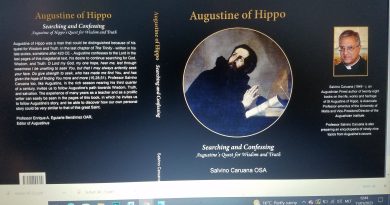The Annunciation: God’s salvation through Mary’s humble and generous cooperation
Today, Thursday 25 March 2021, is the Solemnity of the Annunciation when the angel Gabriel visited Mary and announced to her that she would be the mother of Jesus Christ, the Son of God, the only Redeemer of the world.
God’s sending of his Son did not occur into a vacuum. It direly needed that much awaited YES of Mary. That is why the great Father of the Church, St Bernard of Clairvaux, in homily on the Annunciation and Mary’s “fiat” said that the whole world was practically waiting impatiently for her assent.
You have heard, O Virgin, that you will conceive and bear a son; you have heard that it will not be by man but by the Holy Spirit. The angel awaits an answer; it is time for him to return to God who sent him. We too are waiting, O Lady, for your word of compassion; the sentence of condemnation weighs heavily upon us.
The price of our salvation is offered to you. We shall be set free at once if you consent. In the eternal Word of God we all came to be, and behold, we die. In your brief response we are to be remade in order to be recalled to life.
Tearful Adam with his sorrowing family begs this of you, O loving Virgin, in their exile from Paradise. Abraham begs it, David begs it. All the other holy patriarchs, your ancestors, ask it of you, as they dwell in the country of the shadow of death. This is what the whole earth waits for, prostrate at your feet. It is right in doing so, for on your word depends comfort for the wretched, ransom for the captive, freedom for the condemned, indeed, salvation for all the sons of Adam, the whole of your race.
Answer quickly, O Virgin. Reply in haste to the angel, or rather through the angel to the Lord. Answer with a word, receive the Word of God. Speak your own word, conceive the divine Word. Breathe a passing word, embrace the eternal Word.
Why do you delay, why are you afraid? Believe, give praise, and receive. Let humility be bold, let modesty be confident. This is no time for virginal simplicity to forget prudence. In this matter alone, O prudent Virgin, do not fear to be presumptuous. Though modest silence is pleasing, dutiful speech is now more necessary. Open your heart to faith, O blessed Virgin, your lips to praise, your womb to the Creator. See, the desired of all nations is at your door, knocking to enter. If he should pass by because of your delay, in sorrow you would begin to seek him afresh, the One whom your soul loves. Arise, hasten, open. Arise in faith, hasten in devotion, open in praise and thanksgiving. Behold the handmaid of the Lord, she says, be it done to me according to your word.
The Solemnity of the Annunciation teaches us alot of lessons. First, it teaches us to serve delicately and wisely. St Josemaria Escriva writes: Following her example of obedience to God, we can learn to serve delicately without being slavish. In Mary we don’t find the slightest trace of the attitude of the foolish virgins, who obey, but thoughtlessly. Our Lady listens attentively to what God wants, ponders what she doesn’t fully understand and asks about what she doesn’t know. Then she gives herself completely to doing God’s will: Behold the handmaid of the Lord, be it done unto me according to your word.
Second, the Solemnity of the Annunciation instructs us that our YES to God matures day after day. Pope Emeritus Benedict XVI writes: How often in these situations must Mary have returned inwardly to the hour when God’s angel had spoken to her, pondering afresh the greeting: ‘Rejoice, full of grace!’ and the consoling words: ‘Do not be afraid!’ The angel departs; her mission remains, and with it matures her inner closeness to God, a closeness that in her heart she is able to see and touch.
Third, the Solemnity of the Annunciation makes us more aware that of the trinitarian dimension present in it. Hans Urs Von Balthasar notes: The scene of the Annunciation merits consideration for another reason, too: it is not only wholly Christological; it is wholly trinitarian as well…The angel’s initial salutation…brings her the greeting of the ‘Lord’, Yahweh, the Father…she will give birth to the ‘Son of the Most High’…the Holy Spirit will overshadow her…
Fourth, the Solemnity of the Annunciation shows that the human race’s Yes to God was represented in a woman’s YES, Mary. St Pope John Paul II underlines this point when he said: The whole ecclesial movement of women can and should reflect the light of Gospel revelation, according to which a woman, as the representative of the human race, was called to give her consent to the Incarnation of the Word. It is the account of the Annunciation that suggests this truth when it tells that only after the “fiat” of Mary, who consented to be the Mother of the Messiah, did ‘the angel depart from her’ (Lk. 1:38). The angel had completed his mission: he could bring to God humanity’s “yes”, spoken by Mary of Nazareth.
Fifth, the Solemnity of the Annunciation unravels that Mary’s YES came from a pure noble soul. The German Catholic theologian, Karl Adam, wrote: But all the sublimity of Mary’s moral personality, all the depth of her virginal devotion, and all the strength of her faith culminate in the word which she spoke to the angel: ‘Behold the handmaid of the Lord, be it done unto me according to thy word.’ These were no common, everyday words…They were words out of the depths and recesses of a soul that was pure and noble beyond all earthly measure, words that were her being, her expression, her achievement…
Sixth, the Solemnity of the Annunciation describes God’s enfleshed love for the new humanity in Mary. The Venerable Archbishop Fulton J. Sheen presents the following reflection: When the angel appeared to Mary, God was announcing this love for the new humanity. It was the beginning of a new earth, and Mary became ‘a flesh-girt Paradise to be gardened by the new Adam.’ As in the first garden Eve brought destruction, so in the garden of her womb, Mary would now bring Redemption.
Seventh, the Solemnity of the Annunciation outlines, as St Bernard of Clairvaux said at the beginning of these reflections, humanity’s full cooperation in God’s salvific work. Mary is surely the exemplar of this cooperation. The Franciscan Friar of the Immaculate, Fr. Settimio M. Manelli, said: Such ‘consent,’ given by Mary, is not merely private, but expresses the willing participation of man, of humanity, in the work of salvation. In the freedom of Mary, at that instant, were contained all the desires, fears, and hopes of man in need of redemption. And the New Eve spoke her full, total yes to the angel of light, just the first Eve had once spoken her yes to the angel of darkness. Moreover, the response given by Mary to the angel also expresses, in addition to her consent, a humble and unconditional dedication to the plan of God entrusted to her.
Eighth, the Solemnity of the Annunciation demonstrates Mary’s total trust in God. St Teresa of Calcutta put forward the following insight when she said: Mary showed complete trust in God by agreeing to be used as an instrument in his plan of salvation. She trusted him in spite of her nothingness because she knew he who is mighty could do great things in her and through her. Once she said “yes” to him, she never doubted. She was just a young woman, but she belonged to God and nothing nor anyone could separate her from him.
Ninth, the Solemnity of the Annunciation drives home the fact that love for God demands an unhesitant ‘yes’. The great charismatic Filipino priest, Fr Federico Suarez, put it nicely when he said: In the pronouncing of the word fiat, ‘be it done unto me’; the Virgin’s answer is definite and final; its force impresses us. It is more than a simple ‘yes.’ Once the request was answered, there could be no subsequent changes of heart; it demanded a complete submission of the will; an abandonment of herself, not to do some specific thing, but to do all the things that God had planned for her in exactly the way that He intended that they should be done; she was asked to renounce completely the right to plan her own life.
Tenth, the Solemnity of the Annunciation Mary’s YES becomes the anithesis of Eve’s NO to God’s love for humanity. Bishop Robert Barron explains: The Church Fathers were fond of exploring the relationship between Eve, mother of all the living, and the new Eve, Mary the Mother of God. Where Eve grasped and lost, Mary surrendered and received; where Eve said no to the alluring mystery, Mary said yes. The angel of the Lord — an agent from a realm beyond what can be seen and known — appears to the maid of Nazareth and greets her in what Balthasar describes as the language of heaven: ‘Hail, full of grace.’
As Pope Francis said in his summary given at the catechesis given at the Library of the Apostolic Palace, on Wednesday 24 March 2021, as we prepare to celebrate the Annunciation of the Lord, may we rejoice that Mary, who said “yes” to the message of the angel, is ever ready to say “yes” to us, interceding before her Son for our needs and for the salvation of the world.
Is there a further proof that Mary’s humble and generous cooperation earns for us God’s salvific favour even today?
Fr Mario Attard OFM Cap





